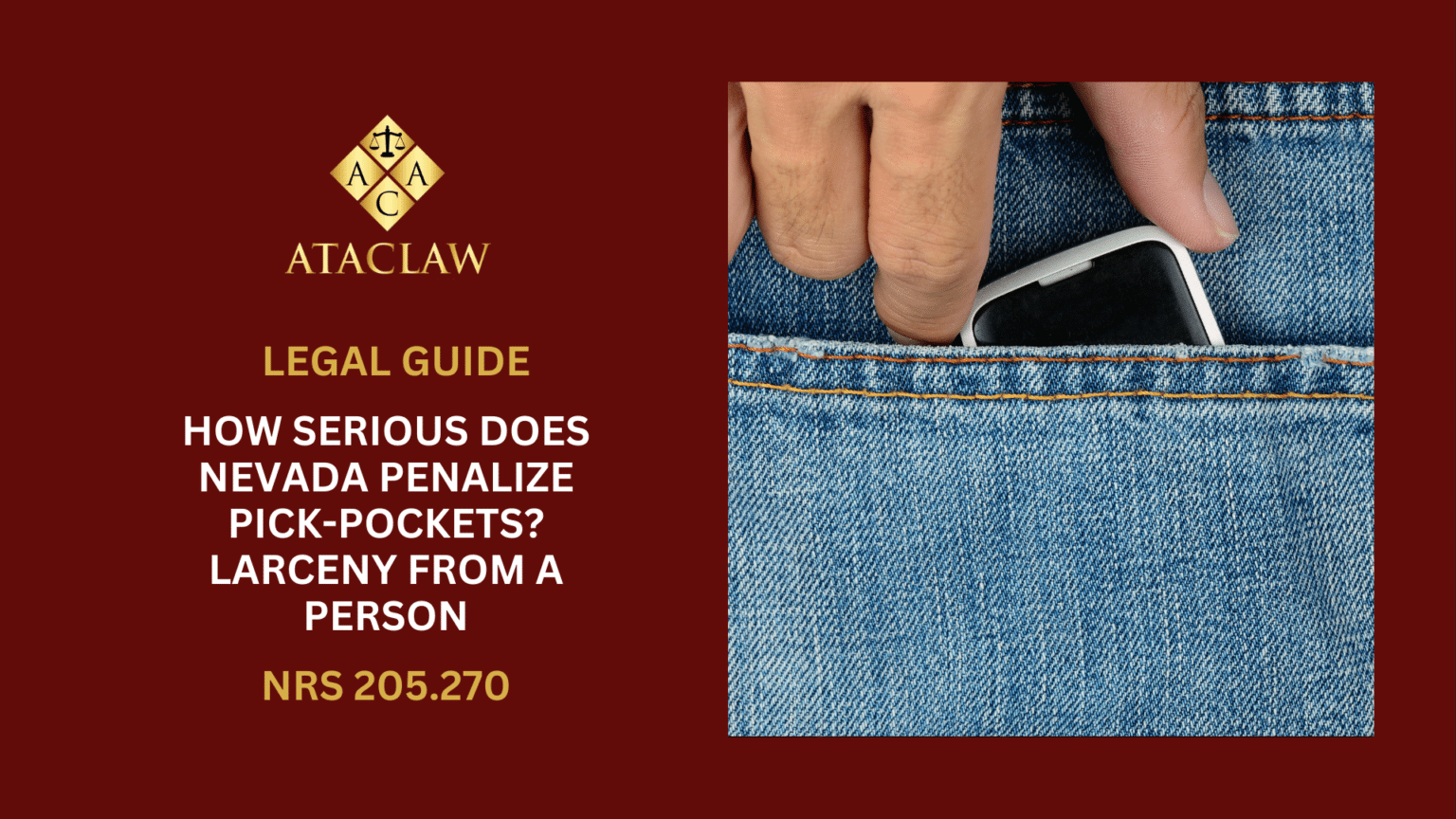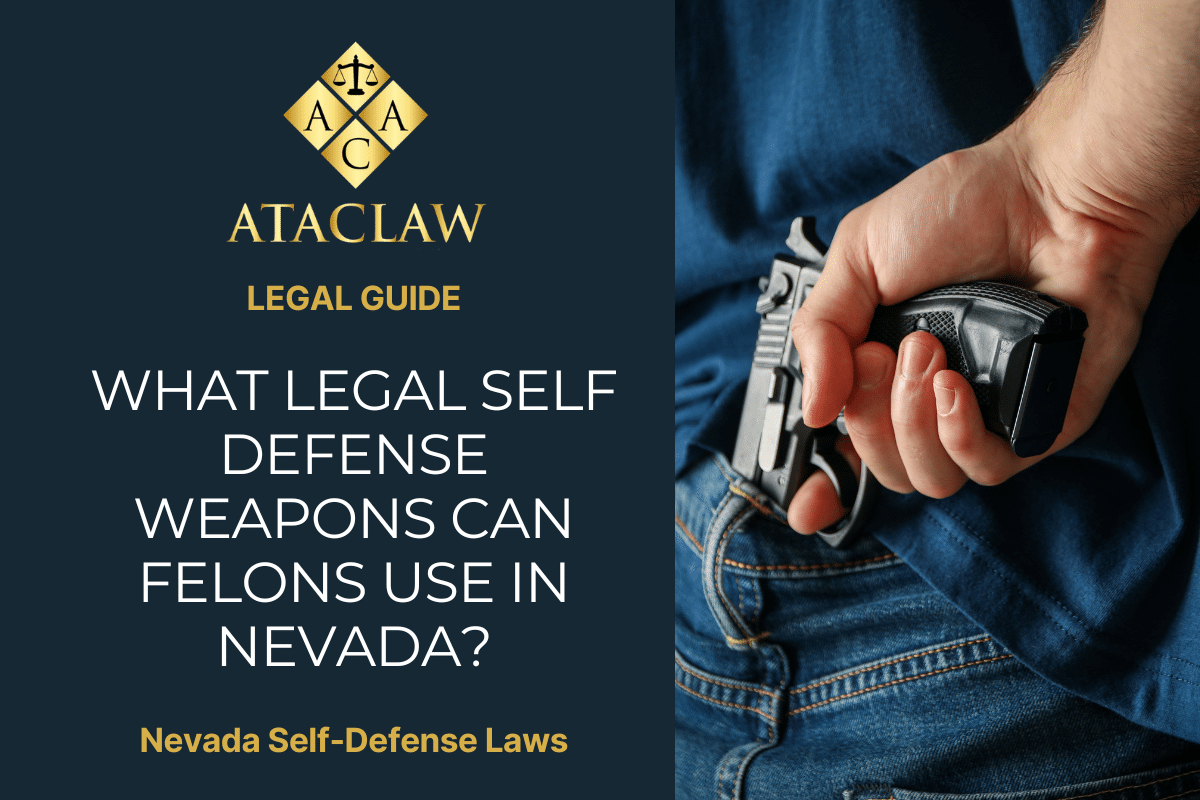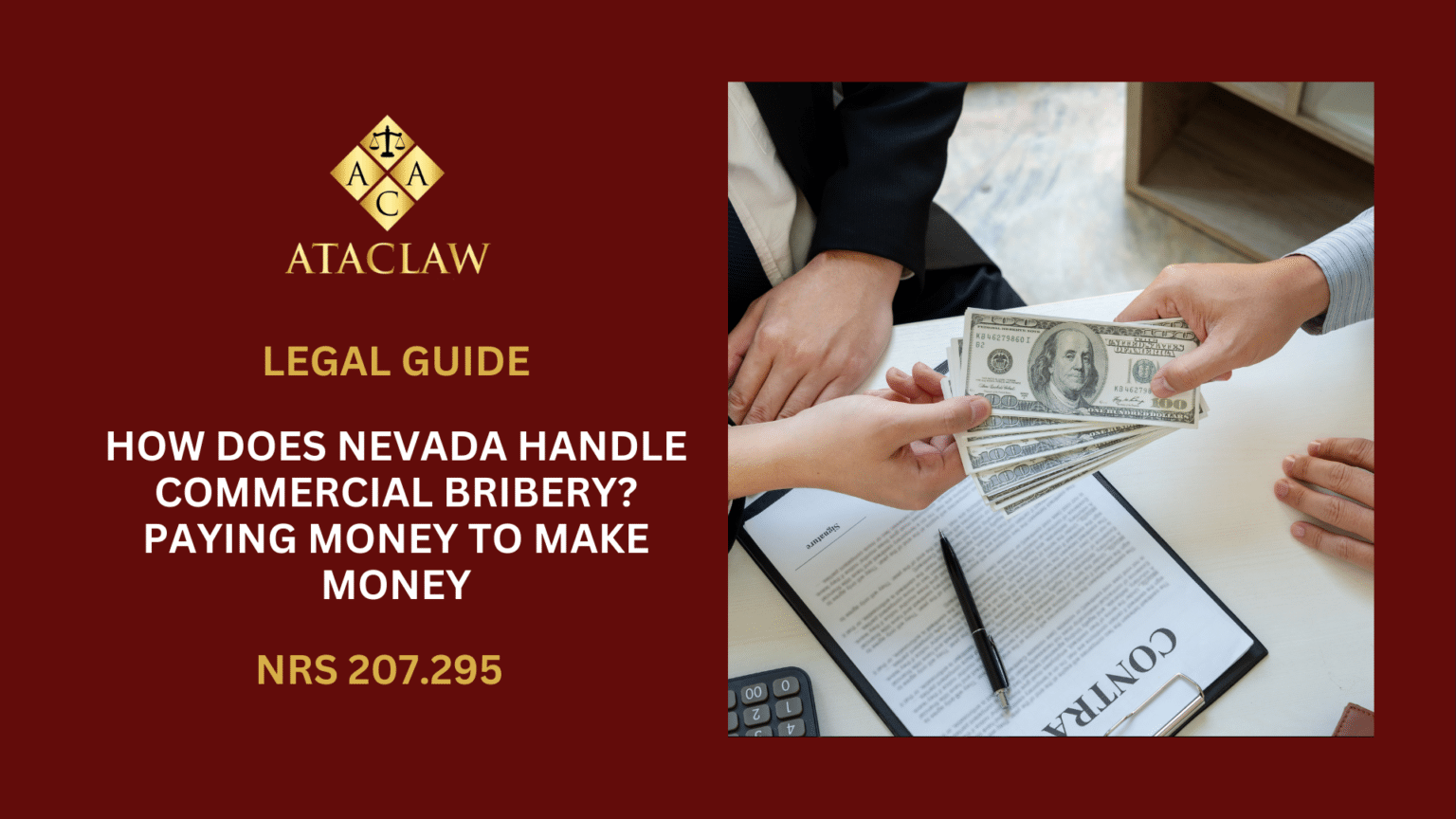In Nevada, theft can range from shoplifting to burglary, but one less violent yet serious theft offense is larceny from a person, often misunderstood by many. At ATAC LAW, we understand the importance of clear, straightforward legal advice. Here’s what you need to know about the specific offense of larceny from a person under Nevada law.
Larceny from a person involves the act of stealing directly from someone’s person without their consent and without the use of force or threats. This crime is different from robbery because it doesn’t involve intimidation or physical violence, making it what many might refer to as “pick-pocketing.”
How Serious is Pick-Pocketing in Nevada?
Have you ever realized much later that something valuable was missing from your purse or pocket? This experience, often unsettling and violating, can be the result of what’s legally termed as larceny from a person, commonly known as pick-pocketing. Unlike its more aggressive counterpart, robbery, which is marked by the application of force or the induction of fear, pick-pocketing in Nevada is characterized by the stealthy removal of personal items without the owner’s consent, awareness, or the use of physical force.
The Subtlety of Pick-Pocketing
Picture this scenario: You’re walking down a crowded street, and without your knowledge, someone delicately removes your cellphone from your bag. This act, carried out so surreptitiously that you don’t realize your loss until much later, perfectly encapsulates larceny from a person. This offense hinges on the thief’s ability to take what’s not theirs without alarming their target, making it a significant crime despite the lack of violence or intimidation typically associated with theft.
From the legal standpoint provided by ATAC LAW, it’s clear that Nevada takes this violation seriously. Unlike robbery, which necessitates an element of force and falls under NRS 200.380, larceny from a person is specifically concerned with the silent yet impactful nature of pick-pocketing. This distinction is crucial for understanding the nuances of theft laws in Nevada and recognizing the severity of seemingly non-violent acts of theft.
What are the Legal Consequences of Pick-Pocketing in Nevada?
Have you ever wondered what might happen if someone is caught pick-pocketing in Nevada? It’s a serious offense, classified as a category C felony, that can lead to a stint in Nevada State Prison ranging from one to five years—this isn’t a matter that ends up in county jail. However, there’s room for judicial discretion, as judges can opt for probation in certain scenarios, except in cases where the victim is particularly vulnerable, due to factors like physical or intellectual disabilities.
Understanding the Financial Penalties Beyond Jail Time
In the aftermath of a pick-pocketing conviction, restitution to the victim is mandatory, meaning the accused is legally bound to compensate for the value of the stolen property. But the financial implications don’t stop there. A criminal court judge has the authority to impose a fine of up to $10,000, adding a significant monetary repercussion to the act of larceny from a person.
Plea Bargains
When someone is initially charged with the more severe crime of robbery, which implicates a possibility of imprisonment for two to fifteen years, the scenario might take a turn if the prosecutor proposes a plea bargain. Switching a robbery charge to larceny from a person, through a guilty plea, often emerges as a favorable outcome. This switch not only potentially reduces the time behind bars but also transforms the nature of the charge to a less severe category of felony.
Legal Guidance from ATAC LAW
Facing the legal consequences of actions that may seem minor or unnoticeable, like pick-pocketing, can be complicated and intimidating. That’s where ATAC LAW steps in. Offering professional legal advice and defense strategies, ATAC LAW is dedicated to ensuring individuals understand their rights and the severity of their charges. Whether it’s negotiating a plea deal or aiming for probation over prison time, it’s crucial to have skilled legal counsel by your side.
How Can You Defend Yourself Against Charges of Larceny from a Person in Nevada?
Are you facing charges under NRS 205.270, commonly known as larceny from a person, in Nevada? Defending yourself against such allegations may seem daunting, but understanding the available legal defenses can be pivotal to your case. Here are several approaches that ATAC LAW may consider when challenging these charges:
- Considering Charge Reduction
In certain scenarios, the district attorney might accept reducing the charge to petit larceny, which covers theft of items valued below $1,200 and is considered a misdemeanor—a much less severe offense. - Challenging Identification Procedures
Misidentification, especially in line-ups, can lead to wrongful charges. Highlighting procedural errors or unreliable eyewitness testimony could form part of your defense. - Claiming Entrapment
If law enforcement entices you to commit a crime you wouldn’t have otherwise committed, this can be considered entrapment, which is a complete defense. - Highlighting Absence of Intent
Larceny requires an intention to steal. If you lacked the intent to unlawfully take or keep someone else’s property, this could negate the larceny charge. - Addressing False Accusations
Unfortunately, false accusations do occur. Proving that you’ve been falsely accused is a powerful defense that can lead to the dismissal of charges. - Confirming the Owner’s Consent
If you can show that the person willingly allowed you to take the property, charges of theft become irrelevant, as consent is a complete defense. - Asserting Your Rightful Ownership
Claiming that the property in question actually belonged to you is a valid defense. This negates any assertion of theft if you can provide evidence that supports your ownership. - Arguing Unlawful Search and Seizure
If the allegedly stolen property was discovered during an illegal search, the evidence might be suppressed, weakening the prosecution’s case. - Demonstrating a Lack of Action
Another defense is to establish that you simply did not take any property from the other party, thereby disqualifying the act of larceny altogether. - Leverage Legal Proceedings in Your Favor
With property crimes, the prosecution is tasked with proving the defendant’s guilt beyond a reasonable doubt. Elements like eyewitness testimonies, surveillance recordings, and the properties in question themselves often serve as primary evidence. Having competent legal representation, like ATAC LAW, to challenge the prosecution’s evidence can significantly impact the outcome of your case.
Don’t Face Legal Challenges Alone
If you’re up against charges of larceny from a person, it is crucial to have adept legal advice tailored to your unique situation. ATAC LAW provides the expertise in Nevada law required to challenge these accusations effectively, ensuring that every viable defense strategy is explored to its fullest potential. Remember, a strategic defense can mean the difference between a conviction and acquittal, so take action and consult with legal professionals at ATAC LAW to protect your rights and fight for your freedom.
Can You Seal Your Criminal Record in Nevada?
In Nevada, the possibility of sealing your criminal record varies depending on the specific charges and the outcome of your case. For those charged with larceny from a person, it’s reassuring to know that there are pathways to clear your record and move forward.
- Sealing Records for Larceny from a Person
If you’ve been convicted of larceny from a person in Nevada, you potentially can have this conviction sealed. However, you must wait five years after the completion of your case — meaning all sentences and conditions must be fully resolved — before applying for a record seal. - Opportunities for Reduced Charges
Should your charge be reduced to petit larceny, the waiting period to petition for sealing your record reduces significantly. After one year from the conclusion of your case, you can apply to have this charge sealed. This shorter wait time is advantageous and can help you restore your record sooner. - Immediate Relief for Dismissed Charges
If your charge is dismissed — meaning the court decided there wasn’t enough evidence to convict you — you are eligible to seek a record seal immediately. This immediate eligibility is a crucial aspect for those who have had their charges dropped, allowing them to clear their name without delay.
At ATAC LAW, we sympathize with those who find themselves on either side of such allegations. Understanding the nuances of charges like larceny from a person can be pivotal. If you or someone you know is facing similar charges, it’s crucial to seek knowledgeable legal representation that can provide both guidance and advocacy in facing such complex legal waters. Contact ATAC LAW today to ensure your rights and future are vigorously defended.
For further legal assistance and to discuss your case with an expert, don’t hesitate to contact ATAC LAW.




